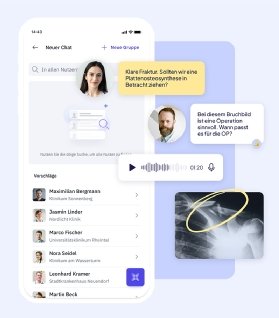Germany's healthcare system has launched a program that aims to improve communication and decision-making by replacing faxes, phone calls and voice mail with encrypted messaging services.
The project, which is supervised by the German National Agency for Digital Health, Gematicpromises a highly secure alternative to WhatsApp that will allow patients, healthcare providers and insurance companies to coordinate care.
Initial tests have shown that the service, known as TI Messengerhas resulted in significant time savings for medical staff, freeing them from making repeated phone calls to talk to colleagues who are often too busy to answer the phone.
The service also promises to provide a more reliable and verifiable alternative to fax messages, which are widely used in hospitals and clinics. Germany has a population of 83 million and 5.7 million healthcare workers who could benefit from using TI-Messenger.
In July 2025, the project reached an important milestone when, by government decree, all German citizens with public health insurance using their insurers' apps were given the opportunity to use TI-Messenger.
Secure Communication
Marie Ruddekproduct manager at Gematicsays the project aims to develop a messaging protocol for the healthcare sector in Germany that will allow each healthcare facility to communicate in a secure way while maintaining control over its own data.
“The goal is to provide everyone with a messaging system so that everyone can communicate with each other in healthcare. To achieve this, we want to give every healthcare provider in Germany the opportunity to create their own messaging system,” she told Computer Weekly.
Gematik published the initial TI-Messenger specification in 2021 based on Matrix Open Networking Technology Standardwhich is gaining popularity among European governments as a “sovereign” alternative to the messaging and collaboration software provided by big US tech companies.
Matrix, which describes itself as an open protocol for decentralized secure communications, is coordinated by the non-profit public interest company The Matrix.org Foundation.
Pharmacists see benefits of messaging
A trial of TI-Messenger in Hamburg last year showed that it could lead to significant time savings in communications between pharmacists and doctors in hospitals.
One of the pharmacist's jobs is to review patients' medications to see if medications may conflict with each other. The study found that pharmacists typically made 10 phone calls a day, each of which could last half an hour, to discuss medications with doctors.
“I'd like to see what we develop [with TI-Messenger] and what we learn from our mistakes that are transmitted across borders to other health systems.”
Marie Ruddeck, Gematics
They often had to make several calls before successfully establishing contact because doctors were too busy to answer the phone. Pharmacists using TI-Messenger found that they only had to make one call per day.
Another trial is due to begin next year in Bavaria, at a university clinic that plans to use TI-Messenger to connect patients, pharmacists and doctors.
TI-Messenger is available in two versions. TI Messenger ePA became available for download to all German citizens with public health insurance from July 15, 2025.
The second version, TI-Messenger Pro, also released in 2025 and aimed at doctors, nurses, pharmacies and insurance companies, has not yet achieved widespread adoption. It allows healthcare professionals to send secure messages, conduct group chats and share documents.
Most health insurance companies already have their own messaging service or are implementing one, Ruddeck said. Clinics are also beginning to implement this technology.
Adoption has been slower among physicians. Their immediate priority is the implementation of ePA, the electronic patient folder, which has been mandatory for storing electronic patient records since October and takes precedence over TI-Messenger.
Chicken and egg
Ruddek says one of the biggest challenges is the need to reach a critical mass of people using the TI-Messenger network to make it a more useful tool.
She describes the “chicken and egg problem” where people say, “Why would I use an app to talk to people when there are no people to talk to?”
Ruddeck says it's important for insurers and other companies that provide TI-Messenger services to explain the benefits of messaging to the public and the healthcare industry.
“We need to convince people to create clusters. Let's talk to your pharmacy, your doctor, your health service,” she says.
Philip Short is the founder As is known, first TI-Messenger app approved by Gematik in 2024. He suggests that doctors should have financial incentives to use TI-Messenger, and that making it easier for clients to connect will help.

Ruddeck acknowledges that large organizations can have a difficult time changing employee behavior. Doctors can use unofficial applications such as Signal.
TI-Messenger requires more work to set up than off-the-shelf messaging services, but once it's up and running, it's easy to use, she says.
Ruddek says Gematik's decision to support open source technology was a step forward. “But we were able to do it because we really wanted to use this protocol. It's a state-of-the-art solution,” she says.
Vision of the future
Ruddek says the future of Gematik lies in creating an integrated healthcare system that ensures people get the information they need when they need it.
Doctors often take notes on paper – for example, when a patient is being transported by ambulance to the hospital. Sometimes their handwriting is difficult to read and information can get lost. People have to spend time typing data into computer systems.
“We want to be as digitized as possible and have information where it needs to be, when it’s needed,” she says. “We have all the information, but we don’t yet have the right systems to provide it everywhere,” Ruddek says.
“I think with TI-Messenger we can really change people's behavior away from phone calls and emails,” she adds. In the future, it may be possible to automate some responses or patient triage.
Ruddek met with other government officials at the Matrix conference in October and hopes to develop collaboration with other countries that are also deploying Matrix-based messaging services.
Norway, Luxembourg and the Netherlands are among the countries considering introducing the technology into their health services.
“I would like to see what we develop and what we learn from our mistakes that are transferred across borders to other health systems,” she says.
Ultimately, it may be possible to develop a European health identifier that can link patients across health systems in many countries.








